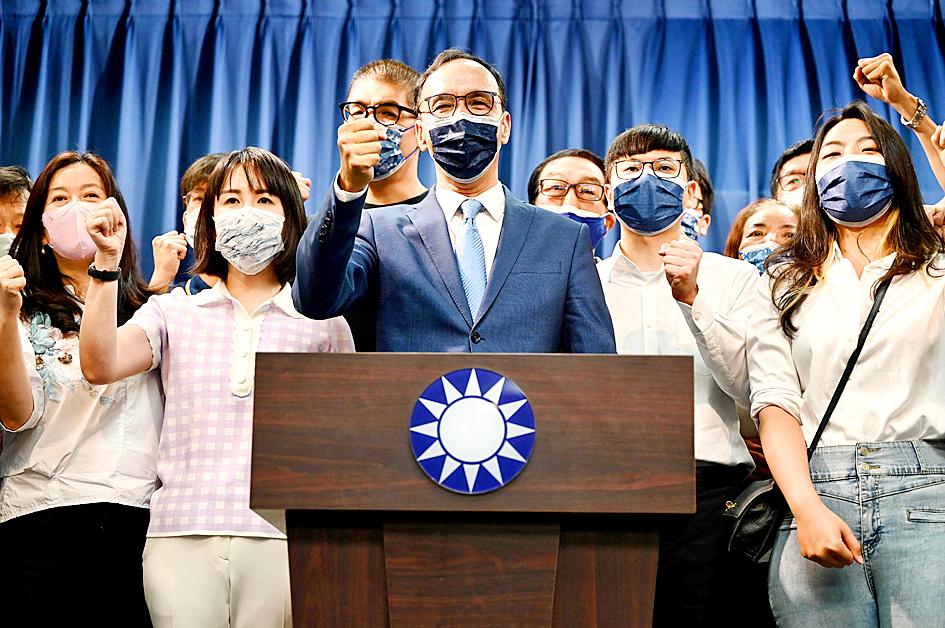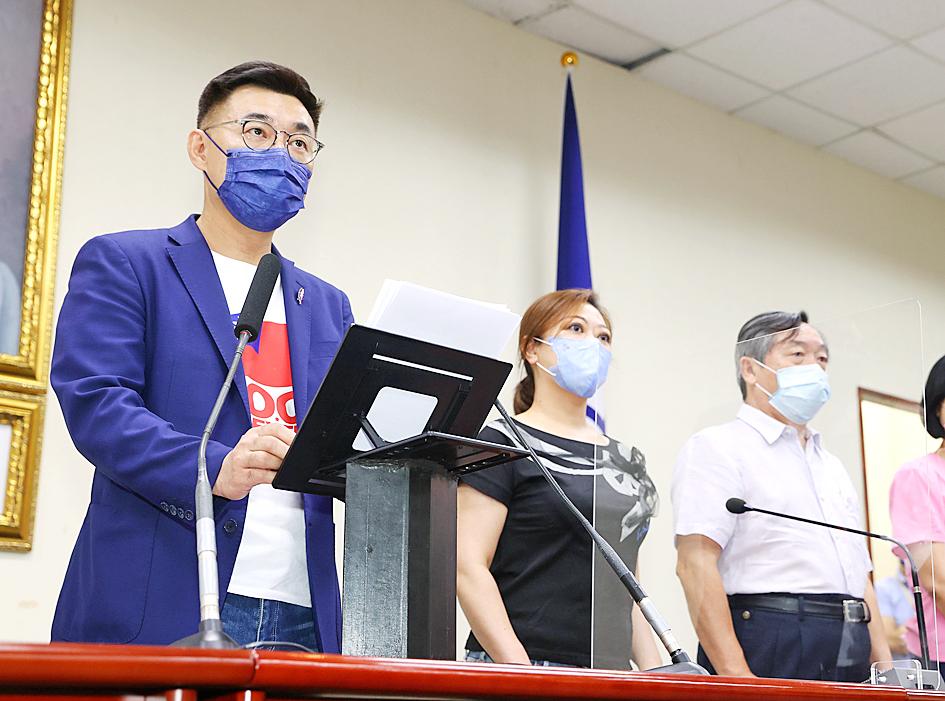Former New Taipei City mayor Eric Chu (朱立倫) was yesterday elected Chinese Nationalist Party (KMT) chairman in a four-way race that included outgoing chairman Johnny Chiang (江啟臣).
Chu, 60, garnered 85,164 votes, or 45 percent of the 187,998 KMT members who cast ballots. Sun Yat-sen School president Chang Ya-chung (張亞中) trailed behind with 60,632 votes, followed by Chiang with 35,090 votes and former Changhua County commissioner Cho Po-yuan (卓伯源) with 5,133 votes. Voter turnout was 50.71 percent.
This will be Chu’s second time heading the party. He was elected KMT chairman in an unopposed by-election in January 2015 and resigned in January 2016 following the party’s losses in the presidential and legislative elections.

Photo: Sam Yeh, AFP
In his victory speech yesterday, Chu said his election would be the start of the Democratic Progressive Party’s (DPP) worries.
“The KMT will unite in an unprecedented manner, and we will fight for the pan-blue camp’s decisive victory,” he said. “We will fight for people’s rights and resist the DPP’s overbearing and aggressive behavior.”
Asked by reporters what his approach would be to relations with China, Chu said the Taiwan-China relationship is “very important,” and that he would strive to open all channels of communication with China.

Photo: CNA
Chu also reiterated his intention to open a KMT representative office in the US.
Chu added he would travel across Taiwan to gather feedback on ways to improve the party from his supporters and detractors alike.
He would seek to restore confidence in the KMT and encourage involvement of young people in the party’s improvement, he said.
Following the election results yesterday evening, Chiang at the KMT headquarters in Taipei led party officials in resigning en masse and tasked KMT caucus secretary-general Lee Yen-hsiu (李彥秀) with handling the handover of the party leadership to Chu.
Chiang said that despite his personal loss in the election, he felt the results to be demonstrative of a “democratic test for the party, which is a win for everyone.”
Chiang offered his congratulations to Chu and thanked the other two candidates for their participation in the election.
His next step would be to campaign across the nation to garner support for two referendums sponsored by the KMT that are to be put to a vote in December, he said, adding that he would also work to encourage more young people to participate in the party’s improvement.
Chang said the results were "very regretful," but that he also felt he had "taken the first step on the path toward rousing the party spirit."
"This is the foundation that will carry the party forward," he said. "We must persevere in carrying out Sun Yat-sen’s (孫逸仙) political ideology. Otherwise we can’t be called the KMT."
His second-place election result demonstrated party supporters’ affirmation of his ideals and behavior, he added.
The results of the chairperson election is to be delivered to the party’s decisionmaking Central Standing Committee for confirmation on Wednesday. Chu is to assume office at the KMT National Congress on Oct. 30.
DPP spokeswoman Chien Shu-pei (簡舒培) congratulated Chu on his election win and said the DPP hoped Chu would work together with the administration in the spirit of public will and toward public benefit.
DPP Legislator Lin Chun-hsien (林俊憲) said that Chiang’s defeat in the election meant a rejection of his moderate leadership, while the rapid rise of Chang and his strong performance in the election meant growing support among KMT supporters for unification with China.
Although Chu won the election, the KMT would come under increasing pressure from unification supporters, he said.
Additional reporting by Chen Yun, Hsieh Chun-ling and CNA

MAKING WAVES: China’s maritime militia could become a nontraditional threat in war, clogging up shipping lanes to prevent US or Japanese intervention, a report said About 1,900 Chinese ships flying flags of convenience and fishing vessels that participated in China’s military exercises around Taiwan last month and in January have been listed for monitoring, Coast Guard Administration (CGA) Deputy Director-General Hsieh Ching-chin (謝慶欽) said yesterday. Following amendments to the Commercial Port Act (商港法) and the Law of Ships (船舶法) last month, the CGA can designate possible berthing areas or deny ports of call for vessels suspected of loitering around areas where undersea cables can be accessed, Oceans Affairs Council Minister Kuan Bi-ling (管碧玲) said. The list of suspected ships, originally 300, had risen to about 1,900 as

Right-wing political scientist Laura Fernandez on Sunday won Costa Rica’s presidential election by a landslide, after promising to crack down on rising violence linked to the cocaine trade. Fernandez’s nearest rival, economist Alvaro Ramos, conceded defeat as results showed the ruling party far exceeding the threshold of 40 percent needed to avoid a runoff. With 94 percent of polling stations counted, the political heir of outgoing Costa Rican President Rodrigo Chaves had captured 48.3 percent of the vote compared with Ramos’ 33.4 percent, the Supreme Electoral Tribunal said. As soon as the first results were announced, members of Fernandez’s Sovereign People’s Party

MORE RESPONSIBILITY: Draftees would be expected to fight alongside professional soldiers, likely requiring the transformation of some training brigades into combat units The armed forces are to start incorporating new conscripts into combined arms brigades this year to enhance combat readiness, the Executive Yuan’s latest policy report said. The new policy would affect Taiwanese men entering the military for their compulsory service, which was extended to one year under reforms by then-president Tsai Ing-wen (蔡英文) in 2022. The conscripts would be trained to operate machine guns, uncrewed aerial vehicles, anti-tank guided missile launchers and Stinger air defense systems, the report said, adding that the basic training would be lengthened to eight weeks. After basic training, conscripts would be sorted into infantry battalions that would take

GROWING AMBITIONS: The scale and tempo of the operations show that the Strait has become the core theater for China to expand its security interests, the report said Chinese military aircraft incursions around Taiwan have surged nearly 15-fold over the past five years, according to a report released yesterday by the Democratic Progressive Party’s (DPP) Department of China Affairs. Sorties in the Taiwan Strait were previously irregular, totaling 380 in 2020, but have since evolved into routine operations, the report showed. “This demonstrates that the Taiwan Strait has become both the starting point and testing ground for Beijing’s expansionist ambitions,” it said. Driven by military expansionism, China is systematically pursuing actions aimed at altering the regional “status quo,” the department said, adding that Taiwan represents the most critical link in China’s